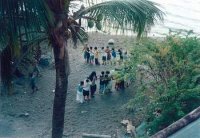

Code of Ethics for the Youth
par Jonhatan O. Biay
Thèmes généraux liés :
Éthique .
Jeunes .
1. Introduction
Last May 7-9, 2006, the multisectoral confederation SANLAKAS held a YOUTH CAMP FOR CULTURAL DEVELOPMENT held in Tanza, Cavite. This was participated in by 43 youth leaders from different organizations in Metropolitan Manila. The camp activities included Music, Art, Drama, and Communication Workshops, and a discussion of the National Political and Economic Situation and the Role of the Youth in Society. One of the activities was the discussion of the Charter of Human Responsibilities and the Code of Ethics for Grassroots Leaders in an effort to develop ethical behavior among the youth sector.
This paper documents the concept of the particular activity on the Charter of Human Responsibilities. The process documentation will follow in another paper.
2. General Objective
Ethics shows what is right and what is wrong. Having a code of ethics enables the youth, based on experiential moments, to concrete analyze concrete conditions and comparatively perceive social realities through investigations that problems do exist in every person’s economic, social, cultural, civil and political life, and that should have been practiced from the very beginning.
Ethics guide the youth to long for a society that is free from any forms of discrimination on age, gender and religion. Ethics help the young to develop respect for people’s rights through dialogue, equality among peoples, and not solely engage in endless discourse on whatever ideology each one has.
Thus, the urgency and need for code of ethics for the new, young and active generation.
3. Specific Objectives
The future of a good or bad ethics depends on how we recreate it now. A holistic approach of development for the youth helps to integrate the effectiveness of a rational mind with their affective emotions, as they perceive realities. A suggested creative approach to propagate ethics include a discerned program and viable activities that will :
a. Create and propagate diverse forms of arts for continued conscientization that deepens the importance and relevance of an ethical life ; and
b. Discover and use own language as medium to fully communicate ethical standards in raising consciousness.
4. Methodology
Popular education encourages participants to overcome the culture of silence that society ingrained in them. This method enables the youth to actively get involved in group workshop discussions and participate dialogically with peers. The use of activity-discussion-input-deepening and synthesis (ADIDS) helps animate the youth’s thoughs and feelings on any given subject matter, specially those that affect their formative stages in life.
Through the pop end approach, it enhances all the senses of the participants to arrive critically from discernment. In arriving at a conclusion in the cycle of learning, from theory to practice, thesis and anti-thesis, and the action-reflection process.
Thus, the praxis and synthesis that were developed along the process, enables the youth to confirm the validity of the dialectics in learning.
5. Program Flow
a. Introduction of the Charter of Human Responsibility and the Code of Ethics for Grassroots Leaders.
b. Activity Workshop
- The participants were asked to break into groups of three with five participants per group.
- Instruction on the popular education approach : “Birds of the same feather flock together.” This is to break the inhibitions and aloofness of the participants.
- The group went into a workshop to discuss the Charter of Human Responsibility and the Code of Ethics for Grassroots Leaders.
- Each workshop group prepared a creative cultural conceptualization and presentation on how they understood the relevance of the code for their generation.
- Plenary-Input/Presentation
- The participants were asked to submit, as they discussed the code in their groups, written feedback reports for documentation purposes.


